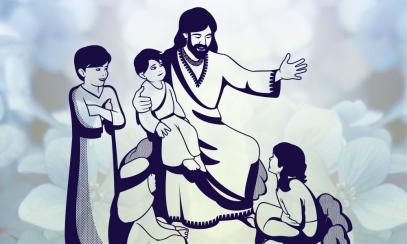
Via Fidelis: ‘You will be my witnesses’ Part 1: What We Do
The love that is directed to us from the beginning of creation is not mere sentiment. It goes far beyond that to capture the very core of our being. Too often, we think of God’s love in sentimental terms. And, while God’s love for us certainly encompasses all that the notion of love connotes, when we truly encounter God’s love, we are never the same. Every aspect of our lives is transformed.
The love that is directed to us from the beginning of creation is not mere sentiment. It goes far beyond that to capture the very core of our being. Too often, we think of God’s love in sentimental terms. And, while God’s love for us certainly encompasses all that the notion of love connotes, when we truly encounter God’s love, we are never the same. Every aspect of our lives is transformed.
As pilgrims walking together on our Via Fidelis journey, we have spent most of the last year together talking about kerygma, the basic proclamation of the Gospel, the Good News of salvation in Christ Jesus. We have briefly reflected on the elements of this message, beginning with God’s loving act of creation. This love endures despite human sinfulness and is manifested in the sending of the divine Son, who takes on our humanity in order to transform it.
The Son embraces all of humanity and human life, even death. His sacrificial death and subsequent Resurrection transform the entire outlook of human existence. Furthermore, to extend to us a share in God’s own life of communion, he sends us his Spirit to dwell with us.
The Holy Spirit responds to our needs, acting in an especially direct and tangible way in the Church and her sacramental life, giving us a means of entering this divine life of salvation. This is good news indeed! In fact, this is the Good News, the kerygma.
But the word kerygma has another sense, that of action. It can be taken as a verb, “to proclaim.” The message that we just delineated is beautiful, wonderful and an idea that goes beyond anything we can fathom. It is not meant, though, to remain an abstract concept or an idea. Christianity is not an ideology: it is a relationship that captures our entire being because, as we just mentioned, Christ himself embraced our entire humanity — not just our minds. Therefore, every aspect of our life matters to him. All our acts should ultimately be seen in the context of our relationship with God.
So, then, what are we asked to do?
In the Acts of the Apostles, the message Jesus imparts to his followers before ascending is to give them, and us, both a promise and a job. He says, “But you will receive power when the holy Spirit comes upon you, and you will be my witnesses in Jerusalem, throughout Judea and Samaria, and to the ends of the earth” (1:8).
While there is much to ponder here, it may be helpful to focus on one of the key words in this message: “witnesses.” This is the job that Christ is asking us to do, to be his witnesses everywhere. Our calling begins wherever we are — note the geographical references in the quote: the apostles are in Judea at that moment, while Samaria is an adjacent territory — but it does not end there. He sends us to the ends of the earth. And we are given the promise of the Holy Spirit in order to have the power to do this job.
When we think of the word witness, we often think of a court of law, where someone gives testimony that he or she saw something happen. And, next month, we will visit the idea of the importance of verbalizing our testimony to Christ as his witnesses. But first, it is helpful to realize that the word that means witnesses in this passage from Acts is martyres (μάρτυρες). It is the root of our word martyr, where we typically think of a person who dies for the faith. Since the earliest times of the Church, we have talked about the testimony witness (μαρτύριον, martyrion) of those who shed blood for and in imitation of Christ. What the martyrs from the early Church to today teach us is that the essence of witnessing to Christ is giving all we have and are to him and in his service.
We may not all be called to die for Christ in a violent manner. But, we are all called to give our lives to him. The martyrs remind us that witnessing to Christ involves all that we are and all that we do. Therefore, our actions should always be undertaken in such a way as to be and bring Christ to others. We most certainly all fall short of this.
As we strive to be clearer witnesses whose actions show Christ to others, we can be confident that the gift of the Holy Spirit is given to us. In receiving the love of God that transcends sentiment and captures our very essence, we are empowered to live as true martyres — witnesses whose transformed lives proclaim the Good News in every word and deed.
Michael Martocchio, Ph.D., is the secretary of discipleship and the director of the Office of Catechesis and Christian Initiation. Email him at mmartocchio@charlestondiocese.org.



